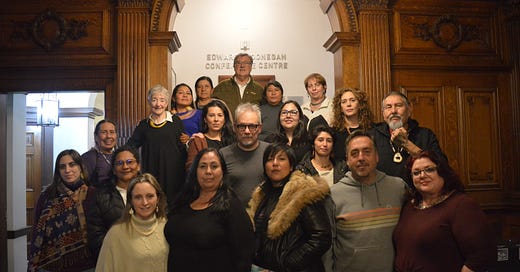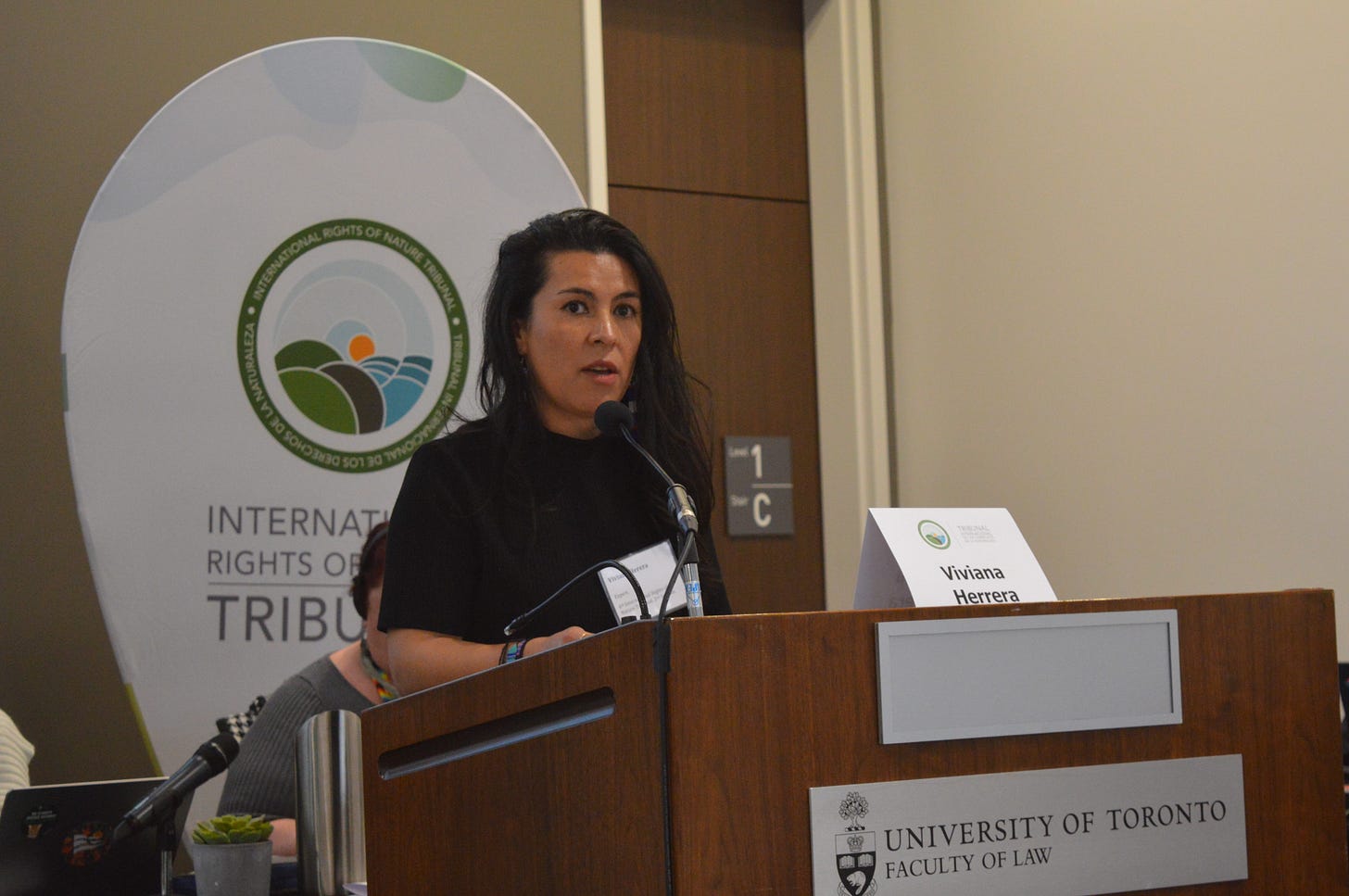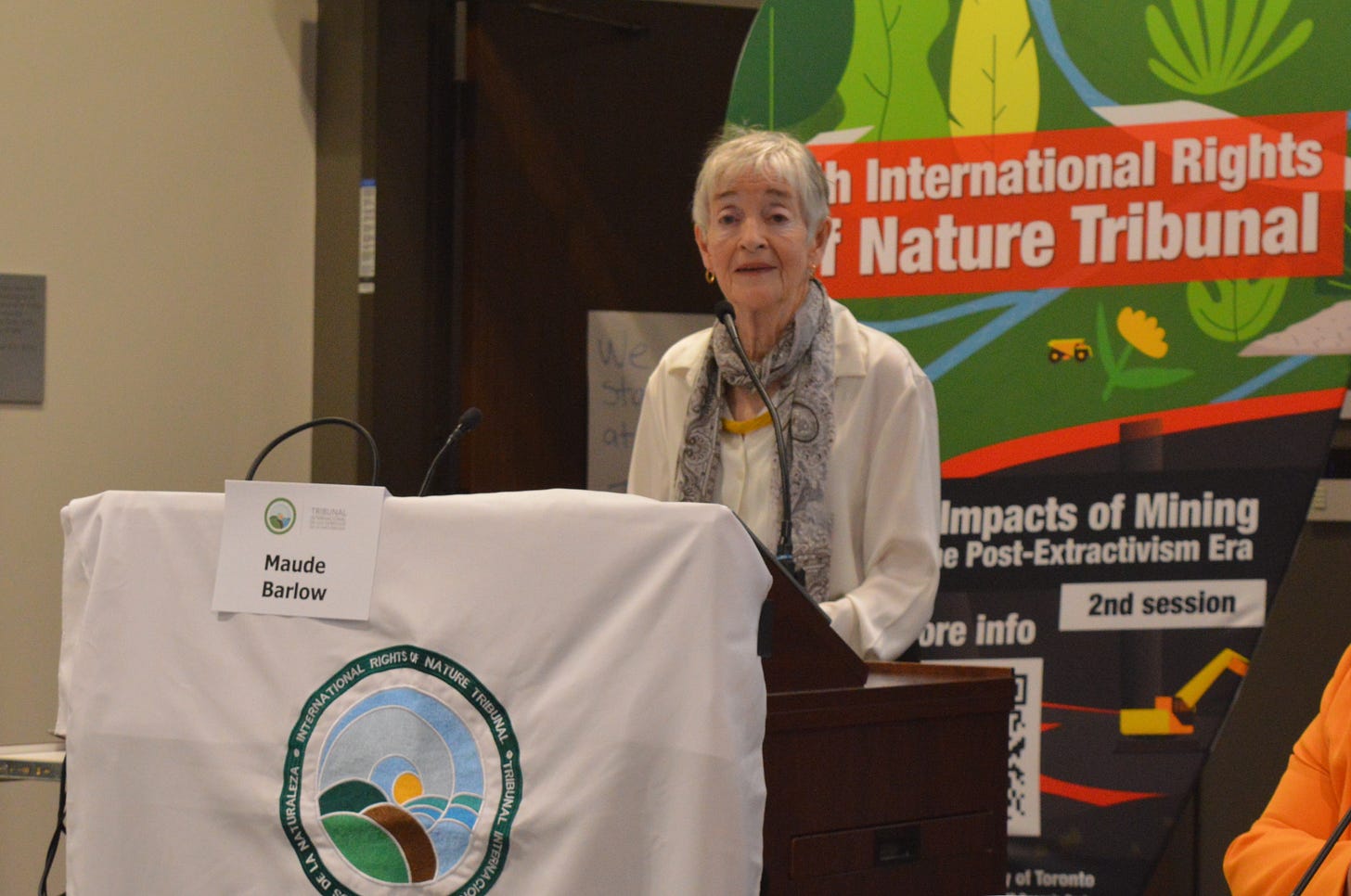Environmental and Indigenous Leaders Find the Mining Industry Guilty of Violating Natural Rights
Story by Emma Bjornsrud
Photos provided by Josefina Mösle, Rights of Nature Tribunal
Setting the Scene: The Commodification of the Environment
Many people and governments view the natural environment simply as a resource. In markets worldwide, natural resources are assigned arbitrary values and sold: for profit, for the advancement of technology, for whatever it may be. This commodification of the environment is otherwise known as the Financialization of Nature.
For those who see the natural environment as something else, something more than a title of land ownership or a permit for “exploration,” participating in defining one’s relationship to nature can be very personal.
For example, Robin Wall Kimmerer has spoken about her relationship to nature as kin. In “Braiding Sweetgrass,” she writes about this kinship as a member of the Potawatomi Nation, but also as a botanist who studied under the academic systems of societies whose relationships to nature are merely self-serving.
In the Global North, most regions and provinces have parks or other natural spaces reserved for recreation. Many public education campaigns, such as reducing, reusing and recycling, have successfully motivated individuals to participate in sustainability efforts. Still, nature conservation can feel daunting for individuals and communities trying to protect their ecosystems from the next bidding war.
The answer may be found in a growing movement to grant legal rights to air, forests, oceans, rivers, wetlands and mountains, acknowledging their intrinsic value. The Rights of Nature movement aims to establish legal protections for natural entities to exist, thrive and regenerate.
The movement is largely rooted in Indigenous traditions of recognizing humans as a part of Nature, and promotes a restructuring of current colonial and oppressive legal systems.
Lucio Cuenca, Director of the Latin American Observatory of Environmental Conflicts, said it is like two sides of the same coin.
“If we have ecocide, we have to have a legal framework to protect it,” Cuenca said.
Mining’s Role in Clean Energy Technology
The demand for fossil fuel alternatives, renewable energies and electric technology has increased, with many governments and institutions calling for a “necessary” clean energy transition.
Minerals and metals including bauxite, cobalt, copper, gold, lithium, manganese, nickel and zinc are required for the production of many “green” technologies, such as electric vehicles, solar panels, wind turbines and hydropower plants.
An increased supply of these “critical energy transition minerals” will be required to meet the rising demand. The International Energy Agency predicts mineral production will have to quadruple by 2040 in order to meet Paris Agreement goals.
With extraction sites concentrated in Africa, Asia, Latin America and the Pacific, governments and corporations are racing to secure their place in this fast-growing, multibillion-dollar industry.
Canada is one of the giants in the international mining industry. In 2023, over half of Canada’s 1,396 mining companies operated expeditions abroad, which made up most of Canada’s total mining assets that year.
However, current industry practices worldwide beg the question of whether a “just” transition to meet the energy needs of the post-fossil fuel era will be possible. Despite Canada’s reputation as a leader in environmental and human rights movements, it is one of many countries whose mining industries are facing allegations of human rights violations, Indigenous rights violations and environmental degradation.
Indigenous leaders and environmental activists from around the world convened for an International Rights of Nature Tribunal on Feb. 28, 2025 in Toronto, Ontario, to hear cases of communities and ecosystems impacted by Canadian-led mining expeditions.
This non-binding ethics Tribunal was held as a formal trial, with an Earth prosecutor and a panel of judges making recommendations in response to the testimonials presented.
Heather Milton-Lightening, the Tribunal President, said the goal of this session was to amplify the perspectives of Indigenous peoples in Canada and around the world who are impacted by mining corporations. In a context of rapid technological advancement, the Tribunal came together to expose the effects of industrial Canadian mining worldwide and to promote the Rights of Nature as a necessary, fundamental shift in the ways humans view and interact with Mother Earth.
One of Canada’s largest organizations in the mining and mineral exploration industry is the Prospectors and Developers Association of Canada (PDAC).
The Judges’ Assembly of the International Rights of Nature Tribunal made a strategic decision to hold this session just days before the start of this year’s PDAC convention, which also took place in Toronto, Ontario.
PDAC’s annual convention, touted the “World’s Premiere Mineral Exploration and Mining Convention,” took place at the beginning of March and drew a crowd of over 27,000 participants.
James Yap, the Tribunal’s Earth Prosecutor, acknowledged in his opening remarks the size of the convention, whose organizers and attendees he said are “eager to find more opportunities to profit from the destruction of our planet.”
The Mining Injustice Solidarity Network (MISN), a Toronto-based activist group, protests violence perpetrated by Canadian mining companies on Indigenous communities worldwide. MISN also rallied in opposition to this year’s PDAC convention.
PDAC’s general “Sustainability” website page includes promises to listen to and address community concerns, among stating other human rights and environmental commitments. PDAC was unable to accommodate an interview request to elaborate on their goals of supporting a “competitive, responsible, and sustainable mineral sector.”
Nature’s Guardians
The 6th International Rights of Nature Tribunal was organized into two sessions. The first, which took place in September 2024 during New York’s Climate Week, called for a global transition away from fossil fuels.
The second session in Toronto, entitled “The Impacts of Mining and the Post-Extractivism Era,” focused on vulnerable communities and ecosystems which are threatened by negligent and unethical mining practices, specifically by some Canadian mining companies. The findings of each session will be presented in Brazil at the UN Climate Change Conference, COP30, this November.
Witnesses and experts presented case studies from a handful of Southern American countries, as well as Serbia and Canada. The Tribunal served as an opportunity to come together to hold companies and corporations violating the rights of humans and their environments, as well as the enabling governments and institutions, accountable.
Ana Zbona shared background data from the Business and Human Rights Resource Centre’s Transition Minerals Tracker, which collects information about human rights and environmental abuses associated with the extraction of seven of the key minerals required for a clean energy transition. Zbona testified to seeing a pattern of environmental pollution or degradation by mining companies, followed by limited or absent consultation with affected communities and often leading to violence against human rights defenders.
The Tribunal’s judges heard 14 cases against Canadian mining companies and returned from deliberations with 14 counts of violations of Indigenous rights and the Rights of Nature.
First, experts presented an update on the Belo Sun gold mine in Xingú Territory, Brazil.
Belo Sun, a Canadian mining company, has been accused of illegally acquiring public land, violating due diligence procedures, and unlawfully criminalizing land defenders, in its race to create the largest open-pit gold mine in Brazil. The project would endanger a critical river ecosystem in the Amazon, so local residents and environmental activists have engaged in legal and social battles opposing Belo Sun for over a decade.
Experts presented the Tribunal with the story of José Rones, a beneficiary of Brazil’s agrarian reform program, who was recently arrested while planting food and trees for allegedly assaulting the armed men working for Belo Sun, a claim he denied.
The Tribunal called for the suspension of Belo Sun, and published a letter of support for Rones. The judges found Belo Sun and Brazil guilty of violating the Rights of Nature.
Next, a witness presented the case of mining for heavy rare earth elements in Penco, Chile, by Canadian company Aclara Resources. Chile is home to ionic clay deposits from which Aclara can harvest heavy rare earth elements for the production of permanent magnets, used in renewable energy technologies and electric vehicles.
Local communities and environmental defenders oppose increased mining in Penco for many reasons, including a lack of transparency by Aclara and a fear of environmental and cultural degradation.
The judges found Aclara Resources, Canada and Chile guilty of violating the Rights of Nature.
Next, the Tribunal heard about Canada’s lithium mining impacts in its own territory, a growing concern as the International Energy Agency expects the demand for lithium for clean energy technologies to skyrocket.
The witness for this case, Jordyn Burnouf, shared firsthand experience from her time as a student working in the nuclear industry. She testified to witnessing, if not directly experiencing, labor rights violations, sexual harassment in the workplace and environmentally degrading practices.
The judges found the companies, the nuclear industry and Canada guilty of violating the Rights of Nature.
Experts from Argentina then shared about lithium mining and the lasting impacts of the largest mining spill in the country’s history.
Disaster struck in 2015, when a valve failed at a Barrick Gold mine in Argentina, spilling over 260,000 gallons of cyanide solution into a nearby river, threatening ecosystems and human lives. Domingo Jofre testified to the impacts of the spill, which he said were originally concealed by Barrick Gold and the government.
Barrick Gold still operates in the area, despite two subsequent spills and local residents’ opposition to the project.
Witnesses also testified to the negative impacts of lithium mining on local Indigenous populations living in the Jujuy province of Argentina.
The judges found the companies, Barrick Gold and those operating in the Salinas Grandes and Laguna de Guayatayoc Basin, and Argentina guilty of violating the Rights of Nature.
Viviana Herrera, the Latin America Program Coordinator for MiningWatch Canada, an organization serving as a watchdog for the Canadian mining industry, works directly with Indigenous and rural communities dealing with social and environmental effects of Canadian-run mining projects.
She spoke at the Tribunal about the recently finalized, but not yet ratified, Canada-Ecuador Free Trade Agreement (FTA). The FTA would make it easier for Canada to import Ecuadorian goods, including minerals and metals, with fewer tariffs. However, it includes a system called investor-state dispute settlement (ISDS), despite a referendum in Ecuador’s constitution banning ISDS from future trade agreements.
With ISDS included in the FTA, Herrera said MiningWatch Canada anticipates increased violence against human land defenders, ecosystems and entire regions. The negotiation process was opaque on the Canadian side of things, she said, and completely ignored the communities’ voices.
“Investors in the mining industry’s interests were prioritized,” she said.
The judges found the Free Trade Agreement, Canada and Ecuador guilty of violating the Rights of Nature, and urged the governments to reject and not ratify the FTA.
The Tribunal also heard updates on seven cases from a local Rights of Nature Tribunal in Ecuador, as well as one case from a local Rights of Nature Tribunal in Serbia.
The judges found the companies involved, Ecuador and Serbia guilty of violating the Rights of Nature.
The panel of judges gave oral verdicts after hearing each of these cases, and issued a set of formal, actionable recommendations for governments and other responsible institutions.
“The judges of the Tribunal call for the UN Special Rapporteur to investigate the impact of critical mineral extraction on Indigenous Peoples' rights, urge the adoption of a UN Binding Treaty on Business and Human Rights, and demand the recognition of the Rights of Nature in affected countries,” the International Rights of Nature Tribunal press release states.
Natalia Greene, Secretariat of the Tribunal, said the judges are recognized for their ethical authority and were appointed by community members on the frontlines who are struggling to defend their territories from mining operations.
Maude Barlow, one of the judges on the panel, said it was an honor to participate in the collegial process of sharing and listening to one another.
“The distinguished nature of the panel does indeed lend credence to the outcome as of course, it is not an official court of law, so its value is political and cultural,” she said via email.
Barlow is the founder of the Blue Planet Project and has been recognized internationally for her work as an activist. She has written 20 books and many reports, including a discussion on the financialization of the environment and what she calls its antidote, the Rights of Nature Movement.
Heather Milton-Lightening, the Tribunal President, said the Rights of Nature could lead down a path to collective innovation for ways to supersede unjust systems.
“What is it that we really want to replace these systems with? It probably doesn't exist, and that's exciting,” she said.
You can watch “The Impacts of Mining and the Post-Extractivism Era” session here.
“A final judgement, the ‘New Pact with Mother Earth,’ will be presented at COP30 in Belém, Brazil, in November 2025, building on the first session of the 6th International Tribunal hearing in New York during Climate Week 2024, themed ‘The End of the Fossil Fuel Era’, and this second session in Canada, to emphasize that the fossil fuel and mining industries are interconnected components of the same destructive system and must be addressed collectively,” the International Rights of Nature Tribunal press release states.







Thanks for writing this, Emma; I hadn't heard of the Rights of Nature movement or the tribunals. Mining certainly isn't going away, and as you point out, is necessary in the movement away from fossil fuels--can we get to a place of extraction without exploitation?
Excellent piece Emma. Very well written and well sourced. This is how journalism is done!